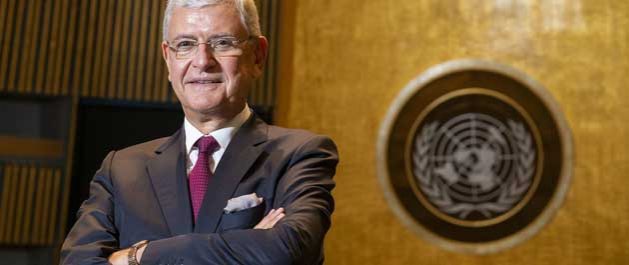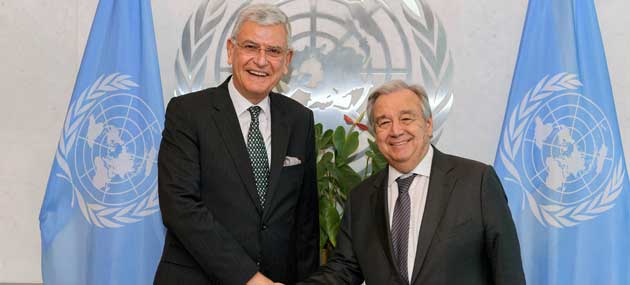INTERVIEW: the top diplomat shepherding the General Assembly through its 75th year

H.E. Mr. Volkan Bozkir, President-elect of the 75th Session of the United Nations General Assembly. Credit: UN Photo/Mark Garten
NEW YORK, Sep 14 2020 (IPS) - The Turkish diplomat elected to be the president of the 75th session of the UN General Assembly, Volkan Bozkir, is taking on the role as the Organization grapples with an unprecedented pandemic, and questions surrounding the future direction it should take.
Mr. Bozkir, a highly experienced public servant, and recently Minister for European Affairs, with almost 50 years of professional experience, was elected from the Western European and Others (WEOG) group of nations, and follows Nigeria’s Tijjani Muhammad-Bande.
Mr. Bozkir joined Turkey’s foreign service in 1972, and has held several senior diplomatic positions, including Consul General in New York, Ambassador in Bucharest, and Permanent Representative of Turkey to the EU.
Ahead of the 75th session, Mr. Bozkir sat down with UN News, to discuss how to ensure that the UN stays relevant in the decades to come, why it is he will be making the protection of vulnerable people and communities a key issue during his year in the presidency, and how he intends to cope with the challenges posed by the COVID-19 pandemic.
GA President: Of course, COVID-19 has become an overwhelming priority and focus right now. That is why I chose to adapt the theme for the 75th session of the UN. Member States chose the theme: “The future we want, the United Nations we need: reaffirming our collective commitment to multilateralism”. I added to that, “confronting COVID-19 through effective multilateral action”, because the pandemic is testing our institutions like never before: we have a duty to take effective action at the global level to overcome this virus, and the havoc it is wreaking on our economies and societies.
UN News: The UN is 75 years old this year. What does this anniversary mean to you as President of the GA during this session?
GA President: COVID-19 is a global crisis the world hasn’t known since the UN was created out of the ashes of World War Two. It is not only a health crisis, but a social and economic crisis, which has exacerbated existing challenges the UN is seeking to overcome through the 2030 Agenda for Sustainable Development and the Sustainable Development Goals.
The whole of humanity is in this fight together. It is time for unity. Member States have never had a more compelling reason to work closely together for the common good. And I am certain that, together, we will come out of it stronger.
In all these endeavours the UN, in particular, the General Assembly has a central role to play. Through this body, Member States set norms and direct our collective resources to addressing common challenges. Vaccines is a case in point. Will the COVID vaccine be a global common good shared equitably? This is a disease that does not respect national boundaries. We are not safe until we are all safe.
GA President: This landmark anniversary is a unique opportunity to look back on what has already been achieved and build on these achievements to overcome the challenges currently facing multilateralism and the UN.
Institutions need to adapt and reform themselves to stay relevant and fit for purpose. I support the UN reform agenda, and the sweeping changes we have seen in the areas of peace and security, development and management. These steps are crucial to make the entire UN family more united and coherent.
The United Nations, to this day, is the only international organization with universal membership that establishes the norms for dealing with global problems through multilateralism. And the General Assembly is the only UN organ where all Member States have an equal voice.
UN News: Why have you made vulnerable people and groups a focus of your presidency?
GA President: Global challenges and crises take the worst toll on the most vulnerable persons and countries. People in need or under oppression should feel that their concerns are being heard in the UN’s most democratic body. I will work to bring the voices of the world’s people into our discussions.

Ambassador Volkan Bozkir (left) of Turkey, incoming President of the 75th Session of the UN General Assembly, meets with Secretary-General António Guterres back in January 2020. Credit: UN Photo/Manuel Elias
UN News: 2020 is a significant year for women’s rights. We are celebrating the 25th anniversary of the Beijing Declaration and Platform for action and the 20th anniversary of the landmark UN Security Council resolution on Women, Peace and Security. What actions will you take to ensure the empowerment of women and girls?
GA President: Evidence shows that gender equality supports greater levels of peace and prosperity. Women often lack access to decent work, equal pay, quality education and adequate health care. They suffer from violence and discrimination and are often under-represented in political and economic decision-making processes. And unfortunately, with the spread of the COVID-19 pandemic, even the gains made in the past decades are at risk of being rolled back. That must change.
Improving women’s lives makes our societies more inclusive and productive, which helps everyone. As the principal international standard-setting institution, the United Nations bears a special responsibility to lead by example.
For my part, I have paid special attention to gender parity while forming my own team, which now includes more women than men, and is at gender parity in senior management. And I will ensure a gender lens is applied to the work we do across peace and security, human rights, humanitarian issues, and sustainable development.
UN News: On a personal level, how did you become interested in public service? What motivates you?
GA President: As a career diplomat and politician for nearly 50 years, I have spent my entire professional life in public service. It was a source of pride for me to serve my country and my nation.
Now I am at the beginning of a new and equally proud chapter, where I will be serving all UN members. My motivation for taking on this challenging new role is my strong conviction in the effectiveness of multilateral diplomacy, and also my desire to serve and make contributions, even small ones in history’s flow, to the overall well-being of humanity. I cannot think of a much better place than the UN to work for that.
Source: UN News
tinyurlis.gdv.gdv.htu.nuclck.ruulvis.netshrtco.detny.im
